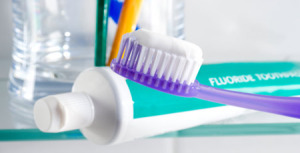What are the Dental Benefits of Fluoride
A naturally occurring compound found in many foods and in drinking water, fluoride has been proven to effectively reduce the prevalence of dental caries and tooth decay.
How does this work, exactly?
Strength Over Time: Fluoride makes teeth stronger to help prevent initiation of tooth decay resulting from acid contained in sugars and the breakdown of carbohydrates.
Therapeutic Output: Fluoride re-mineralizes areas of the teeth that are weakened by acid.
Fluoridated Choices
Fluorides come in two basic forms topical which are applied externally and systemic form which are ingested
Topical Fluorides: These fluorides strengthen teeth by providing better resistance to decay.

At home -this category includes toothpastes and home mouth rinses, Most toothpastes and mouth rinse now contain fluoride, and most people get their fluoride this way. Fluoride toothpaste is very effective in preventing tooth decay. The amount of fluoride in toothpaste is usually enough to lower the level of decay
All children up to three years old should use a toothpaste with a fluoride level of at least 1000ppm (parts per million). After three years old they should use a toothpaste that contains 1350ppm to 1500ppm.Parents should supervise their children’s tooth brushing, and use only a pea-sized smear of fluoride toothpaste until they are about 7 years old.

In office – this category includes gels, foams and rinses incorporated during your dental visits. Gels and foams are used for individuals who are at high risk for caries, orthodontic patients, patients undergoing head and neck radiation, patients with decreased salivary flow, and children whose permanent molars should, but cannot be sealed. The Gel or foam can be applied with a cotton swab or dispensed into a fluoride tray. The patient is then asked to keep the material against the teeth for a total of 60 seconds and patients should not rinse, eat, smoke, or drink for at least 30 minutes after application. Treatment can be repeated in 6 months
Systemic Fluorides: These fluorides include water fluoridation and dietary fluoride supplements. Not all public or private water sources contain recommended levels of fluoridation (0.7 to 1.2 parts fluoride per million parts water). Check with your dentist for information about the fluoridation level in your community’s water. Dietary fluoride supplements may be recommended for children between the ages of six months and sixteen who live in communities without fluoridated water.
What is fluorosis?
‘Dental fluorosis’ is caused by having too much fluoride when the teeth are developing. This can happen when fluoride in drinking water is more than the recommended level. Fluorosis in mild form manifests as white spots or white flecks. In more severe cases, however, the teeth may have stains ranging from yellow to dark brown, surface irregularities and pits that are highly noticeable
